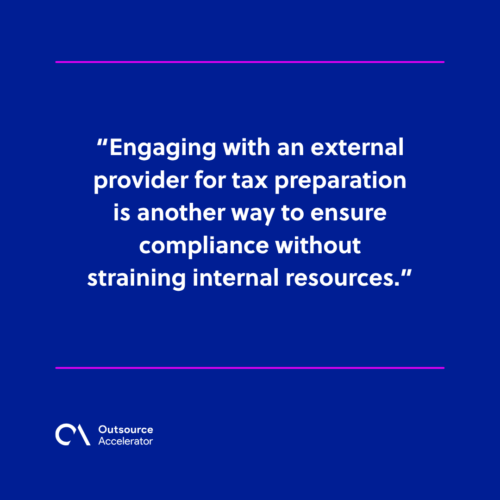How much is self-employment tax for business owners?

Self-employment tax is a critical consideration for business owners who do not receive a traditional paycheck. Understanding how it applies to your business is essential for accurate tax planning, compliance, and cost control.
How much is self-employment tax? This article explains what it is and what actions you can take to manage it throughout the year.
What is self-employment tax?
Self-employment tax is the amount that self-employed individuals and small business owners are required to pay to the federal government to fund Medicare and Social Security programs.
It replaces the portion of the Federal Insurance Contributions Act (FICA) tax that an employer would typically pay on behalf of an employee.
This tax applies when your net earnings from self-employment are over $400 in a year. It also applies if you earn $108.28 or more from a tax-exempt entity. When earnings fall below these thresholds, there is no requirement to pay self-employment tax.
How much is self-employment tax? The self-employment tax rate is 15.3%, broken down as follows:
- 12.4% for Social Security (covers old-age, survivors, and disability insurance)
- 2.9% for Medicare, which covers hospital insurance
How business owners can manage self-employment tax
To maintain proper compliance and manage cash flow, business owners can take the following actions to handle self-employment tax more effectively.
1. Make estimated tax payments
The IRS requires business owners who expect to owe at least $1,000 in taxes to make estimated tax payments on a quarterly basis. These payments should include both income tax and self-employment tax.
2. Deduct the employer portion of self-employment tax
When you’re a self-employed individual, you do not pay self-employment tax on your full net earnings.
nstead, the tax is calculated on 92.35% of those earnings. This percentage accounts for the fact that self-employed taxpayers are treated as both the employer and the employee.
For instance, if a business owner has net earnings of $200,000 in 2025, the taxable amount for self-employment tax purposes would be $184,700 (92.35% of $200,000).
Because this amount exceeds the Social Security wage base limit of $176,100 for 2025, its portion of the tax is only applied up to that cap.
How much is self-employment tax? The self-employment tax would be calculated as follows:
- $176,100 × 12.4% (Social Security) = $21,836.40
- $184,700 × 2.9% (Medicare) = $5,356.30
- Total = $27,192.70
When filing the income tax return, the business owner may deduct half of the self-employment tax (or $27,192.70 ÷ 2 = $13,596.35) as an above-the-line deduction. This deduction represents the employer-equivalent share (7.65%) of the total self-employment tax.
Further, the deduction helps reduce taxable income on the individual return, although it does not reduce the self-employment tax itself.
3. File the self-employment tax form
The tax must be calculated and reported using IRS Form 1040 Schedule SE. This form is typically filed along with your Form 1040 or included with your quarterly estimated tax payments.
4. Work with a qualified tax professional
Tax laws and thresholds, such as the Social Security wage base or deductible portions of self-employment tax, are subject to change. A tax professional stays informed about current regulations and can apply them correctly to avoid errors and penalties.
Engaging with an external provider for tax preparation is another way to ensure compliance without straining internal resources.

How much is self-employment tax for LLCs?
How much is self-employment tax for Limited Liability Companies (LLCs)?
By default, Single-Member LLCs are taxed as sole proprietorships, and Multi-Member LLCs as partnerships. In both cases, each member typically pays self-employment tax (15.3%) on their share of the earnings, unless the LLC elects to be taxed as a corporation.
LLCs may elect to be taxed as S Corporations to potentially reduce self-employment tax, but this election must be properly filed with the IRS.
How much is self-employment tax for partnerships?
How much is self-employment tax for partnerships? Partnerships are pass-through entities. This means the business doesn’t pay taxes directly.
Instead, each partner is responsible for paying self-employment tax on the income they receive from the partnership.
For general partners, this includes:
- Their distributive share of the partnership’s net earnings
- Any guaranteed payments received for services or the use of capital
Both are subject to the 15.3% self-employment tax rate covering Social Security and Medicare contributions.
How much is self-employment tax applied here? Here’s how it would be calculated:
- Total subject to self-employment tax:
$100,000 (share) + $20,000 (guaranteed payments) = $120,000
- Multiply by 92.35% to get the taxable amount:
$120,000 × 0.9235 = $110,820
- Apply 15.3% self-employment tax rate:
$110,820 × 0.153 = $16,958.55
This amount ($16,958.55) is what the partner would report and pay as self-employment tax using Schedule SE.
How much is self-employment tax for S Corporations?
When you operate as an S Corporation you’re considered as both the employee and the employer.
S Corporation owners who actively work in the business pay self-employment tax only on their reasonable salary, which is subject to payroll taxes. Any additional profit they receive as distributions is not subject to self-employment tax.
How much is self-employment tax for S Corporations? For example, if you pay yourself a $70,000 reasonable salary, the total payroll tax rate of 15.3% is split evenly:
- 7.65% is withheld from your salary as the employee portion
- 7.65% is paid by the S Corporation as the employer portion
Take control of your taxes by understanding self-employment tax
Knowing exactly how much is self-employment tax for your business type empowers you to make smarter financial decisions and helps avoid underpayment penalties.
Mastering your self-employment tax responsibilities is not just about meeting legal obligations, it’s a key element of maintaining your business’s financial health.








 Independent
Independent




